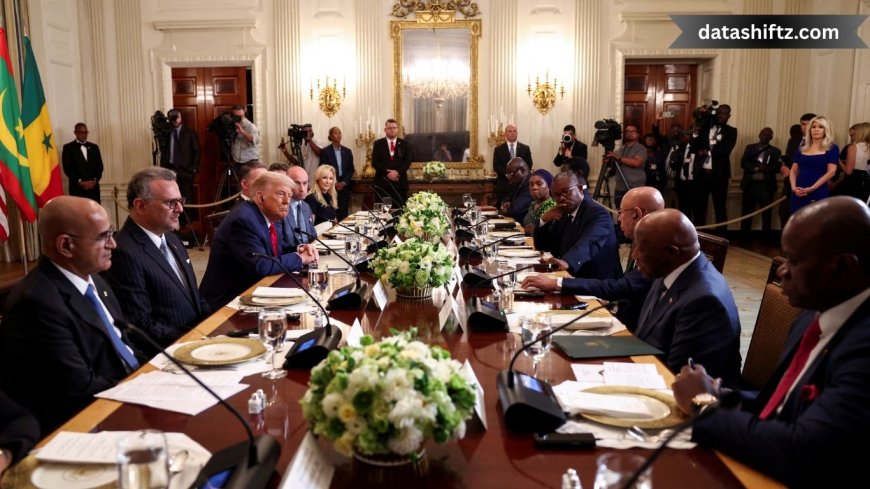Trump’s Remark on Liberian President’s ‘Good English’ Sparks Backlash Across Africa

Introduction
Former U.S. President Donald Trump recently sparked controversy after praising the "good English" of Liberia’s President, George Weah. While some viewed the comment as a compliment, many across Africa criticized it as patronizing and emblematic of a lingering colonial mindset. This incident has reignited conversations about the perceptions of African leaders on the global stage and the subtle biases embedded in international discourse.
Context of the Praise and the Reaction
During a diplomatic event, Donald Trump remarked on President George Weah’s proficiency in English, commending his "good English." On the surface, the comment might seem innocuous or even complimentary. However, it struck a nerve with many Africans who perceive such remarks as underestimating the linguistic capabilities of African leaders, implying that speaking English fluently is unusual or unexpected.
President Weah, a former international soccer star turned politician, leads Liberia — a country with deep historical ties to the English language. English is the official language of Liberia, a legacy of its founding by freed American slaves. Thus, his command of English is both natural and expected, making Trump’s comment appear, to some, subtly condescending.
Why Was This Controversial?
Many Africans, both leaders and citizens, felt that the praise carried an undertone of surprise, suggesting a low expectation for African leaders' communication skills. The criticism reflects a broader frustration with how African countries and their leaders are often viewed through a lens of skepticism or condescension by Western figures.
African Responses: Voices of Criticism and Reflection
Responses from African Leaders and Commentators
| Person/Organization | Response Summary | Tone |
|---|---|---|
| Julius Maada Bio (Sierra Leone President) | Called the comment "unnecessary and demeaning," stressing Africa's rich linguistic heritage. | Critical |
| South African Political Analyst | Highlighted the patronizing nature of such comments and the importance of mutual respect in diplomacy. | Analytical |
| African Union Official | Stressed that African leaders should be judged by their policies, not language skills. | Formal/Neutral |
| Social Media Users | Many expressed frustration and shared memes mocking the surprise at "good English." | Satirical/Angry |
The broad consensus was that Trump’s comment, rather than being a simple compliment, unintentionally reinforced stereotypes about African leaders. Critics argue that it echoes a broader pattern where Africa is viewed as a monolithic entity with limited sophistication.
Deconstructing the Implications of Trump’s Praise
Language and Power Dynamics
The incident reveals underlying power dynamics in global discourse. English, as a global lingua franca, carries significant weight in diplomacy, commerce, and international relations. However, praising a leader from an English-speaking African country for speaking "good English" subtly implies a surprise or exception to a perceived rule that Africans generally do not master the language well.
This perception not only undermines the dignity of African leaders but also oversimplifies the continent's linguistic diversity. Africa boasts over 2,000 languages and many leaders are multilingual, often fluent in English alongside indigenous languages and other international tongues such as French, Portuguese, or Arabic.
Reasons Why the Comment Was Problematic
-
Implicit Bias: It suggests surprise that an African leader speaks English well, revealing implicit stereotypes.
-
Undermines African Sovereignty: Such comments can be seen as minimizing the professionalism of African heads of state.
-
Simplifies African Diversity: It ignores the continent’s rich linguistic and cultural complexity.
-
Reinforces Colonial Narratives: Highlights a lingering colonial mindset that views Africa as "other" or "less developed."
-
Distracts from Policy: Shifts focus from substantive issues like governance, economy, and diplomacy to superficial aspects.
Moving Forward: The Need for Respectful Diplomatic Language
This incident is a reminder of how important it is for global leaders and the media to be mindful of the language they use when discussing leaders from different parts of the world. Diplomacy relies not just on actions but on respectful communication that fosters mutual understanding.
African leaders and their supporters have long called for a more nuanced and respectful portrayal of Africa in international arenas. Celebrating achievements and progress should be based on real accomplishments, not condescending praise.
Conclusion
Donald Trump’s comment praising Liberian President George Weah’s "good English" sparked an important conversation about the subtle biases that persist in international discourse. While seemingly minor, such remarks can reinforce harmful stereotypes and undermine respect for African leadership.
The criticism from across Africa highlights the need to move beyond outdated perceptions and acknowledge the continent’s diversity, competence, and sovereignty. True respect in diplomacy is shown not through surprise at basic skills, but through recognition of leadership and policy achievements.





























